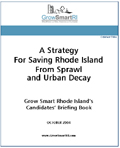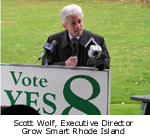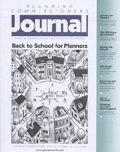|
|
Grow Smart Board of Directors
Michael F. Ryan
Chairman of the Board
Susan Arnold
William Baldwin
S. James Busam
Joseph Caffey
Robert L. Carothers
Arnold Chace
Jen Cookke
Trudy Coxe
Peter Damon
Louise Durfee
Stephen J. Farrell
Thomas E. Freeman
J. Joseph Garrahy
John R. Gowell, Jr.
Stephen Hamblett
Robert Harding
Michael S. Hudner
Stanley J. Kanter
Howard M. Kilguss
Thomas A. Lawson
Dennis Langley
James Leach
Frederick Lippitt
Roger Mandle
Rev. James C. Miller
Thomas V. Moses
George Nee
B. Michael Rauh, Jr.
Gary Sasse
Richard Schartner
Deming Sherman
Merrill Sherman
Curt Spalding
James F. Twaddell
Ranne Warner
Sandra Whitehouse
Frederick C. Williamson
W. Edward Wood
Board Listing with
Affilliation
Staff
Scott Wolf Executive Director
Sheila Brush
Director of Programs
John Flaherty
Director of Research & Communications
Lynn Burns
Office Manager / Executive Assistant
Dorothy Dauray
Office Assistant
Linsey Cameron
Research Assistant
|

Smart GrowthToolbox Topics

|
| |
Dear John,
You're among the 2,086 opinion leaders,
state & local officials, development professionals,
journalists and visionary citizens getting the latest
news, happenings and trends in the smart growth
movement from Grow Smart
Rhode Island.
|
| |
| |
| |
| A growing number of homebuyers favor shorter commutes, walkable neighborhoods |
| |

The prospect of lengthening commutes is leading
more Americans to seek walkable neighborhoods in
cities and close-in suburbs, according to the 2004
American Community Survey sponsored by the National
Association of Realtors and Smart
Growth America.
Among people planning to buy a house in the next
three years, 87 percent selected a shorter commute
as a very or somewhat important factor in deciding
where to live. Asked to choose between two
communities, six in ten prospective homebuyers
chose a neighborhood that offered a shorter
commute, sidewalks and amenities like shops,
restaurants, libraries, schools and public
transportation within walking distance over a
sprawling community with larger lots and limited
options for walking and a longer commute.
These results provide some insight into current
discussions in Rhode Island about growth
and development trends, affordable housing and
transportation priorities. Read
more about the policy implications for Rhode
Island
|
| |
|
| |
| Candidates' Briefing Book expected to influence policy debate long after elections |
| |

There are strong indications that Grow Smart's
recently released Candidates' Briefing Book entitled
A Strategy for Saving Rhode Island From Sprawl
and Urban Decay, will be used as a
resource for affecting positive change at the state
and local level long after the dust settles on the
November elections.
"It's encouraging that we've received feedback from
winning candidates who intend to utilize the issue
briefs to influence the public policy debate on issues
such as economic development, neighborhood
revitalization and property tax reform", said Grow
Smart Executive Director Scott Wolf.
Among the topics covered are:
Economic
Development
|
| |
|
| |
| Big victory for Open Space, Recreation & Clean Water |
| |

On election day, Rhode Island voters provided an
overwhelming mandate for Question 8, the Open
Space, Recreation, Bay and Watershed Protection
Bond Issue. Even though the $70 million measure
was surrounded on the ballot by several other big
ticket bond items totaling more than $300 million, it
passed with almost 71% of the vote, the most
resounding approval of any of the 12 spending
proposals on the state ballot.
See how your community voted
Efforts to preserve Rhode Island's
outstanding "Quality of Place" were further enhanced
on election day by the passage of local open space
bonds in Middletown, Smithfield,
South Kingstown and Warwick.
In a related development, Governor Carcieri
announced on October 26th the awarding of
$3.86 million in grants to towns and land trusts that
will help conserve 1,541 acres in 15 projects across
the state. The money is the last of the $34 million in
open-space bonds approved by voters four years
ago. Read the
article
|
| |
|
| |
| Special PCJ issue on Schools and Planning |
| |

"Creating more neighborhood schools is one
of the most important avenues for advancing quality
of life ... It makes sense from a learning standpoint,
an economic standpoint, and it makes sense if you
want to have schools that are part of a community's
fabric as opposed to part of its sprawl."
Those words by South Carolina Governor Mark
Sanford reflect the growing challenge facing both
planners and school officials: how to make today's
schools an integral part of the community.
The just published Fall issue of the
Planning Commissioners Journal (PCJ) focuses on
schools and planning. It provides an excellent
introduction to some of the issues facing citizens
interested in ensuring that the siting and design of
schools advances both smart growth and educational
goals.
Review the articles
|
| |
|
| |
| Home Builders to recognize innovation in workforce housing |
| |

Builders, architects, designers, developers, and land
planners... enter your development for the 2004
Innovation in Workforce Housing Awards and earn
national recognition for your company. Developments
are eligible if they were completed or if their first unit
was occupied or opened between Jan. 1, 2002 and
Oct. 29, 2004. Entries are due Nov. 19.
Sponsored by the National Association of
Home Builders, the Innovation in Workforce
Housing Awards (IWFHA) are designed to recognize
outstanding examples of workforce housing
developments across the nation that provide decent
and affordable homes for nurses, police officers,
schoolteachers, retail workers, and other key
members of the workforce near areas in which they
work.
Find out more
|
| |
|
| |
| Smart Stuff |
| |
Providence
South Kingstown
|
| |
|
| |
| New England Smart Growth Leaders Share Strategies |
| |
A delegation of Rhode Islanders, including Grow Smart
Executive Director Scott Wolf and officials
from DEM, the Statewide Planning Office and the
Economic Policy Council joined about 40 other smart
growth advocates from throughout New England for
an all day smart growth leadership forum last month
at the Lincoln Land
Institute in Cambridge, Massachusetts.
Much of the discussion centered on fiscal tools to
fight sprawl, including comprehensive property tax
reform; a successful split rate tax concept assigning
a higher tax rate on land than buildings; current use
assessment for open space land; land conservation
bond issues; and reform of state and federal aid
formulas that encourage sprawl. Rhode Island was
singled out by UNH Professor Richard England
for having the best current use tax assessment
policy of the 6 New England states.
An innovative means of encouraging smart growth
oriented affordable housing development in
Massachusetts was also outlined by Northeastern
University Professor Barry Bluestone.
-
Review Richard England's presentation
|
| |
|
| |
| CALENDAR |
| |

Friday, November 12
EPA is accepting proposals for brownfields
assessment, revolving loan fund and cleanup grants.
These grants are part of the Small Business Liability
Relief and Brownfields Revitalization Act to help
states and communities around the country clean up
and revitalize Brownfield sites.
Tuesday, November 16 (9:00a-1:00p)
Workshop:
Planning for the Future of the
Farm
With complicated tax and inheritance laws,
development pressure, and a struggling farm
economy, transferring a farm to the next generation
is not always easy. This workshop is designed to
offer specific information and practical advice to
farmers. The tax implications and conservation
strategies to protect land from development will be
addressed by expert speakers.
$10 per person - includes lunch
Sponsored by Trustees of Reservations
Shelburne Grange Hall
Shelburne, MA
Registration: (413) 268-8219 or email
jchristensen@ttor.org
Tuesday, November 30 (11:30a - 5:30p)
This workshop has been developed in response
to requests from municipal planners. It is designed to
provide participants with a detailed overview of key
zoning strategies and to give participants an
understanding of the relationship between density
and development costs.
Sponsored by The Rhode Island Foundation and
the United Way of Rhode Island.
Crowne Plaza at the Crossings
Warwick
Monday, December 6 (10:30a - 12:30p)
Symposium:
Features speakers to include:
Kip Bergstrom, Exec. Dir., RI Economic Policy
Council
Scott Wolf, Exec. Dir., Grow Smart RI
Michael McMahon, Director, RI Economic
Development Corporation
Barbara Fields Karlin, Senior Program Director, RI
Local Initiative Support Corporation
Mathew Murray, Professor of Business and
Associate Director of the Center for Business and
Economic Research at the University of Tennessee at
Knoxville
Sponsored by the Poverty Institute at Rhode
Island College.
December 6-7 (8:30a - 5:00p)
Visioning has become an accepted technique to
build broad-based agreement on goals and strategies
for the future of a neighborhood, city or region. When
used with visualization techniques, visioning is a
powerful tool for making informed decisions on the
physical quality of future development. This course
defines principles for effective visioning, reviews
three case studies, and includes a hands-on
workshop that demonstrates visioning and
visualization techniques in a realistic situation.
Sponsored by the Lincoln Land Institute
Cambridge, MA
Wednesday, December 8 (8:30a - 5:00p)
As smart growth initiatives gain momentum
across the country, one of the persistent obstacles
to compact development is the public's aversion to
density. Misplaced concerns over density often
prevent the construction of urban infill projects or
the revision of zoning regulations that would allow for
compact growth. This workshop offers planners,
designers and community development officials
specific tools for understanding the link between
urban design and residential density. Using aerial
photography and computer graphics, the program
explores how various design approaches
accommodate different levels of density.
Sponsored by the Lincoln Land Institute
Cambridge, MA
|
| |
|
| |
|